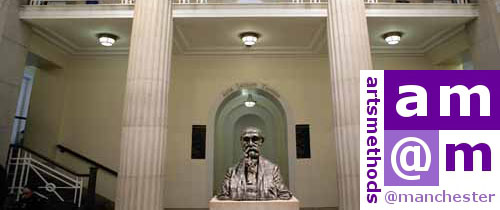Post-Graduate Conference: New Research in Language-Based
Area Studies
(The University of Manchester, the Chancellors Conference Centre, 13-14 March 2014)
Thursday, 13 March 2014
9.30-10.30 – Registration/Arrival Tea/Coffee
10.30-11.30 – Conference Opening, Keynote Lecture 1: Dr. Lara Ryazanova-Clark
(Edinburgh), (title tbc) (The Marquis Theatre)
11.45- 13.15 – Session 1
1.1: Language, Identity and Nation-building (The Griffith Room)
Teresa Wigglesworth-Baker (Sheffield), ‘Discourses of Multilingual Landscaping in Post-Soviet Tatarstan,
Mamtimyn Sunuodula (Durham), ‘Multilingualism and Negotiating Uyghur Identity’
Jelena Calic (UCL), ‘Nation Building and the Creation of Discontinuity: the Case of Serbo- Croatian’
Nika Farnworth (UCL), ‘Language and Morality in Ukraine: Building a Transnational Na tion?’
1.2: Society Through Literature and Film (The Spencer Room)
Hussain Alqarni (Manchester), ‘”Allegiance” Between Religion and Politics in Arabic
Literature’
Olivia Hellewell (Nottingham), ‘Production, Promotion and Polysystems: Domestic vs.
Translated Literature in Slovenia’
Sam Beaton (Glasgow), ‘Helena Třeštíková’s Manželské etudy – The Czech Transition Through the Lenses of Documentary Film’
13.15-14.00 – Lunch
14.00 – 15.00 – Keynote lecture 2: Prof Ian Reader (Lancaster), ‘The Problem of
“Religion” in Japan after the Tokyo Subway Attack: Dangers, Redefinitions and
Wider Implications’ (The Marquis Theatre)
15.00-15.15 – Coffee/Tea break
15.15.-16.45 – Session 2
2.1: Transformation of Cultural and Religious Practices: Between the Global and the
Local (The Griffith Room)
Anastasiia Kudlenko (Glasgow), ‘EU and Islamist Movements in Tunisia: Building a
Constructive Dialogue or Avoiding Engagement?’
Oguzhan Goksel (Durham), ‘The Moderation of the Turkish Islamic Movement: Insights from a Case of Ideological Transformation’
Natalia Khalymonchik (Glasgow), ‘Re-mapping the Global and Local in Russian Anime
Culture’
Anna Seabourne (Manchester), ‘The Value of a Traditional Martial Art in Modern
Japanese Society’
2.2: Migration and Identity (The Spencer Room)
Shengnan Guo (Leeds), ‘Lifestyle Migration or Return Migration? Research on Chinese Luoshang and Their Social Identity’
Lidia Kuzemska (Lancaster), ‘Visa (free) Regime in Multidimensional Power Relations: Case of Ukraine’
16.45-17.15 – Coffee break
17.15-18.45 – Sessio n 3
3.1 : Gender Issues (The Griffith Room)
Siobhan Hearne (Nottingham), ‘”Women on the Fringes”: Female Crime and Deviancy in Pre and Post-Revolutionary Russia’
Ivan Simic (UCL), ‘Soviet Influences on Yugoslav Gender Policies 1945-1955: The
Construction of Gender Relations at Youth Work Actions in Yugoslavia’
Jane Wallace (Leeds), ‘Trapped and Trembling: The Construction of an Intersex Body in IS: Neither male nor female’
Forum Mithani (SOAS), ‘Challenging or Upholding the Patriarchy? The Image of the
Single Mother in Contemporary Japanese Culture’
3.2 : Politics and Nationalism in the FSU countries (The Spencer Room)
Anton Shekhovtsov (UCL), ‘An Uneasy Coexistence: The Ukrainian Extreme Right and the Euromaidan’
Alun Thomas (Sheffield), ‘Central Asia’s Experience of Early Soviet Power: Kazakh Nomads and the State, 1920-1930’
Mumtoz Kamolzoda (Durham), ‘State-building and National Identity in Post-Soviet Central Asia,
19.00 – Dinner
Friday, 14 March 201 3
8.30-9.00 Arrival Tea/Coffee
9.00-10.00 Keynote Lecture 3: Prof. Emma Murphy (Durham), ‘Politics and Theory after the Arab Uprisings’ (The Marquis Theatre)
10.15-11.45 – Session 4
4.1: Political Dynamics between the Global and the Local (The Griffith Room)
Abbas Assi (Leeds), ‘The Syrian Conflict and Lebanon’s Parliamentary Elections: Another Failure of Lebanon’s Democracy’
Saussan Khalil (Leeds), ‘Exploring the Online Language of Egypt’s Revolutionary Youth’
Amy Watson (Glasgow), ‘“Local” Experiences of the “Supranational”: the EU 2020
Strategy and Single Mothers Seeking Employment in Brno’
Siyuan Li (Leeds), ‘China’s Confucius Institute in the Discourse of Power in International Relations: A Case Study of Confucius Institute in Africa’
4.2 : Research Methodologies in Language-Based Area Studies (The Spencer Room)
Nicholas Loubere (Leeds), ‘To Transcribe or Not to Transcribe: Some Reflections on the Analysis of Rich Qualitative Data in Area Studies’
Ruth McKenna (Glasgow), ‘The West Yet glimmers’: Theoretical Approaches to the Study of the Russo-British Relationship and the Value of the Russia-West Paradigm’
Elena Samsonova (Glasgow), ‘The Value Profile of the Pre-transition Generation in Russia: Justification for Qualitative Approach’
Lynley Aldridge (Leeds), ‘The Overseas “Gap Year” in the UK and Japan: Framing the Debates’
12.00-13.00 Lunch
13.00 – 14.30 – Session 5
5.1: Language in Use: Between the Global and the Local (The Griffith Room)
Simon Barnes-Sadler (SOAS), ‘Global Varieties and the Globalisation of Korean’
Vivian Lee and Lu Lu (SOAS), ‘The Analysis of Engagement Features in Spoken Narratives Between Korean and Chinese Native Speakers’
Laura Smith (Oxford), ‘Shi‘i and Salafi Language of Persuasion in Contemporary Egypt: Text and Context’
Nesreen Saud Alhmadi (Leeds), ‘Language Transfer Speaking Errors Among Saudi Students’
5.2: Power and Nationalism in Russia (The Spencer Room)
Marina Henrikson (Manchester), ‘The Discursive Construction of Russia as a Great
Power During the Russia-Georgia War of 2008: a Critical Discursive Analytical Approach to International Relations’
Emma Heywood (Manchester), ‘National Values and Vremya: Reporting the Middle East Conflict’
Matthew Blackburn (Glasgow), ‘Understanding Changing Russian Nationalism: A Cross Generational Study’
Mariana Semenyshyn (Glasgow-Tartu), ‘“People’s Front – For Russia”: a New Old
Instrument of Control’
14.30 – 15.00 – Tea/Coffee break
15 .00-16.30 – Session 6
6.1: International relations: P olitics and Economics (The Griffith Room)
Michael James Willcocks (Manchester), ‘Inventing the Future: U.S.-Iranian Relations and Reform in Iran, 1961-1963’
James Griffiths (Manchester), ‘A Dramaturgical Sociology of British Policy Toward Iran During the Rise of Reza Shah (1921-1926)’
Taylan Güngör (SOAS), ‘The 1838 Anglo-Ottoman Commercial Treaty of Baltalimanı: A Harmonisation With the Prevailing Currents of the World Economy’
Celia Crossett (Glasgow), ‘Corporate Social Responsibility: a Comparison of Cultural
Practices of Multinational Corporations in Kazakhstan and Russia’
6.2: (Post)-Communism in Eastern Europe (The Spencer Room)
Antony Kalashnikov (Oxford), ‘Communist Takeovers in Eastern Europe: Towards a Broader Comparative Approach’
Corina Snitar (Glasgow), ‘Opposing Communism: The 1956 Romanian Students’
Movement’
Ruxandra Bucur (Glasgow), ‘Identifying With the Past: The Failure of Transitional Justice in Post-Communist Romania’
16.30-17.00 Final discussion and concluding remarks
